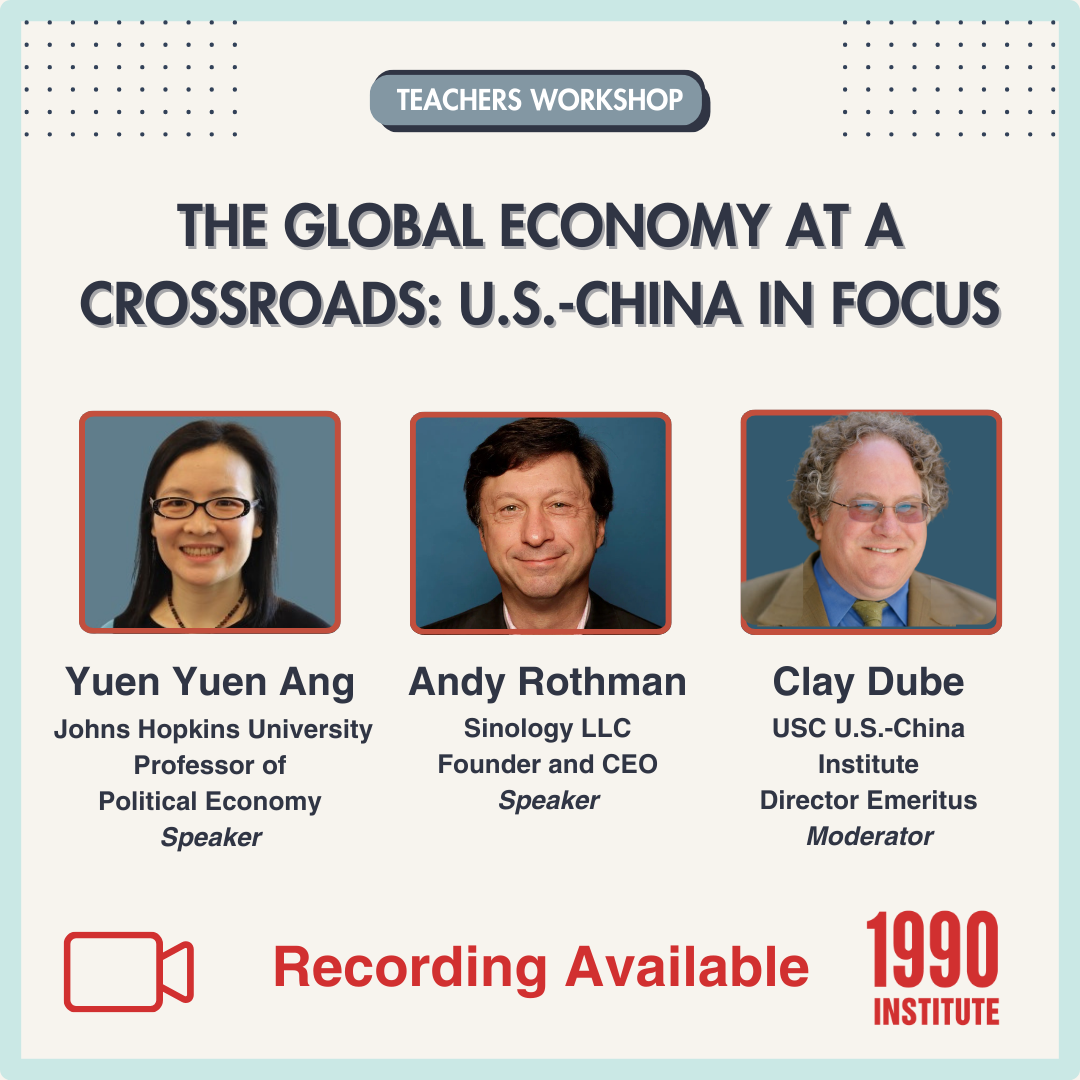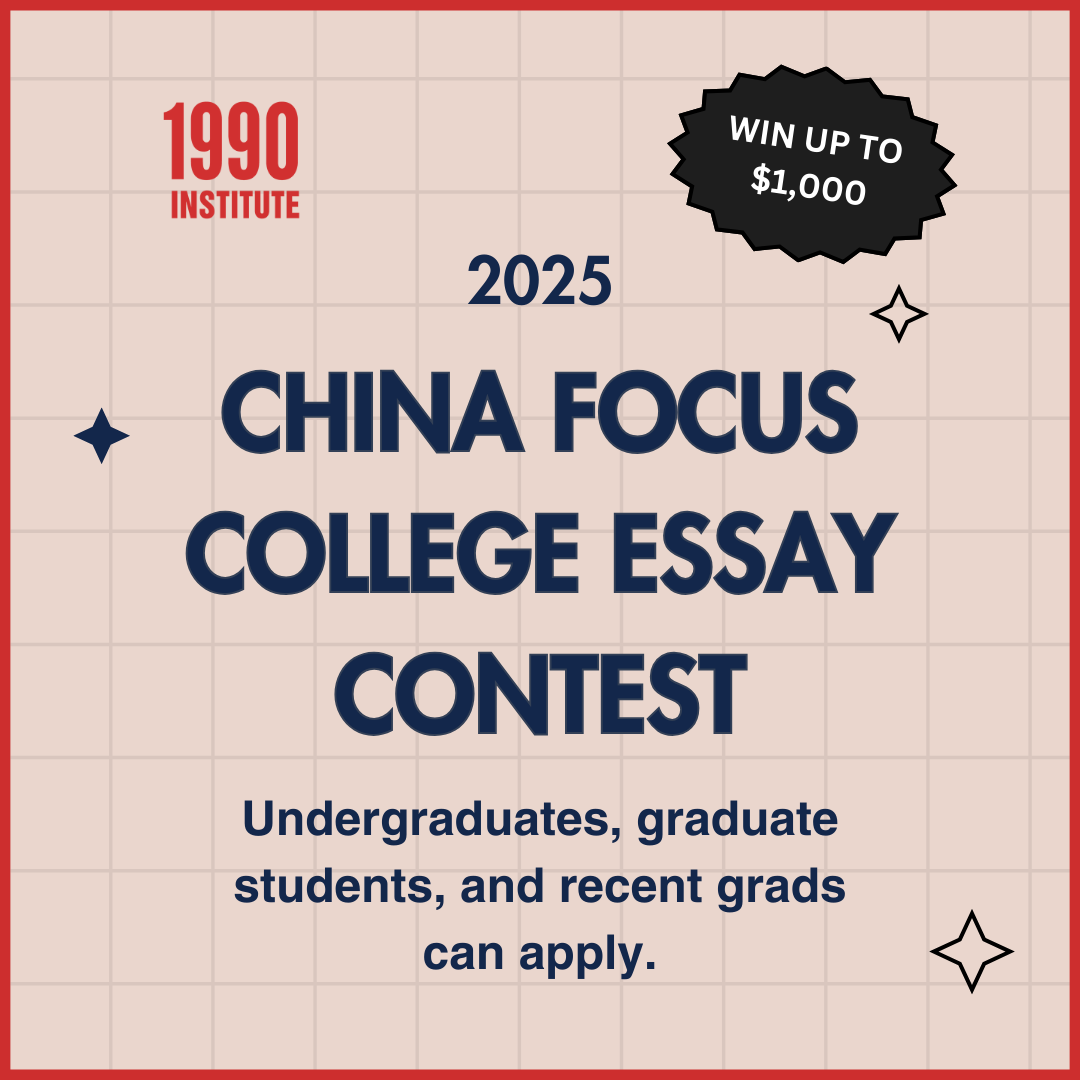| | | | Dear Friends, The 1990 Institute held an engaging Teachers Workshop last week on “The Global Economy at a Crossroads: U.S.-China in Focus.” We received very positive feedback on this workshop. Thank you to all who took the time to join us to discuss the economic interdependencies between these two powers. We are grateful to our panel for sharing their insights with all of us: Yuen Yuen Ang, Professor of Political Economy at Johns Hopkins University; Andy Rothman, Founder and CEO at investment firm Sinology LLC; and Clay Dube, Director Emeritus and Senior Fellow at the USC U.S.-China Institute. The webinar recording is now available on our YouTube channel. Please also use the resources we have curated in our Reference Library and Teachers Portal. If you attended, we welcome your comments. Please contact us at workshop@1990institute.org. We are pleased to announce that our annual College Essay Contest is open for submissions with the opportunity to receive a $1,000 prize. College or university students and recent grads who are interested in U.S.-China relations can enter. The contest offers two topics related to China’s changing power on the global stage. Find more details in our Spotlight section below and enter by May 1. It’s Women’s History Month and we are thrilled to feature Asian American women this month and throughout the year on New Asian American Voices. Do you have a recommendation for a future profile? Contact us at naav@1990institute.org. Scroll down to Spotlight for more news. If you are able to make a charitable contribution of any amount, we would be grateful to continue our work. Please share our newsletters with your friends and family and encourage them to subscribe. Thank you. |
| |  |
|
| | | Not just someone’s daughter, wife, or mother By Denise Yiran Zheng, PhD
International Women's Day or 国际妇女节 in Chinese is celebrated annually on March 8. The term 妇女 typically refers to married or older women and is associated with expectations to engage in motherhood and marriage. However, despite the traditional cultural preferences for sons and the expectations placed on daughters, women in China are increasingly questioning traditional gender roles and redefining their freedom. A greater commitment to advance gender parity is needed in China. The Fourth World Conference on Women in Beijing in 1995 was a landmark event towards the global effort for women's rights and gender equality. It led to 189 nations including China adopting the Beijing Declaration and Platform for Action, an agenda for women's empowerment. However, the gender gap in China has widened over time. Out of 146 economies analyzed in the World Economic Forum’s Global Gender Gap Report 2024, China ranks 106th, declining for the 16th consecutive year (ranked 57th in 2008). In comparison, the United States' ranking has fluctuated, with a general decline in recent years: the U.S. ranked 43rd in 2024 (declining from 27th in 2008). Compared to members of the U.S. Congress, where 28% are women, the Chinese Communist Party (CCP)'s 20th Politburo has no female members. Additionally, no woman has ever served on the smaller Politburo Standing Committee, the highest decision-making body currently comprised entirely of men over the age of 60. The Chinese government is trying to convince women in their 20s and 30s to have children. By the government’s definition, women who are unmarried over the age of 27 are called "leftover women" (剩女). Remarkably, the so-called “leftover women” have great economic power. Chinese women's total and per capita income are increasing faster than men's. This has fueled the rise of a she-conomy: China has nearly 400 million female consumers aged 20 to 60, with annual spending reaching $1.4 trillion. This makes it the world's third-largest consumer market, equivalent to the combined retail markets of Germany, France, and the United Kingdom. Chinese women also contribute 41% to China's GDP, the highest proportion globally. This increased economic power has led more women to reconsider the traditional path of marriage and family. Even though women are likely to be more educated than their partners in China, like in many countries, women are still expected to handle most domestic work, creating a "double burden" that limits career opportunities. In China, women spend roughly three times more time on unpaid domestic and care work than men. For some women, they experience these sacrifices before marriage, and it is perpetuated after marriage. A study revealed that Chinese families, with a strong preference for sons, socialize daughters into the role of “the giver” to contribute financially or through labor to support their parents, often helping cover their brothers' education and living expenses. These daughters are made to feel like an “unworthy receiver” due to gender-based discrimination. The researchers said that this form of “sustained exploitation takes place today and is normalized in so many families.” Nonetheless, there are increased portrayals in Chinese TV shows and social media of older women who are not married. There is also a rise in female stand-up comedians such as Yang Li (杨笠) who are pushing back at patriarchal stereotypes and gender role expectations. Increasingly more of Chinese society is receptive to advocating for women to be treated equally and traditional social norms about women are being questioned openly. Women have been gaining economic power, yet more work is needed to advance their political empowerment. Further Reading on Gender Equality and Women’s Rights in China. |
| |
|
|  | Our 2025 College Essay Contest is open! Higher education students and recent graduates are eligible to enter with essays on one of two topics related to China and the chance to receive up to $1,000. |
| | |
|
| Opinion: Xi's attempts to 'course correct towards pragmatism' will work, says Sinology LLC founder | CNBC Andy Rothman, founder of Sinology LLC and featured speaker at 1990 Institute’s March 2025 webinar, comments on China markets and the reason that the economy is growing slowly. Silk Road merchants may have introduced cats to China 1400 years ago | Science The find strongly suggests cats came to China via the Silk Road, says a geneticist at Peking University who oversaw the research. Anti-South Asian online hate surged in extremist spaces after election, report says | NBC News Some online rhetoric centered around Indians “stealing jobs,” the nonprofit group Stop AAPI Hate said. The report also said that anti-East Asian slurs increased amid perceived threats from China. Trump executive order makes English the official language of the U.S. | NPR The order rescinds a policy requiring agencies to provide assistance programs for people with limited English proficiency. In deporting Asians to Central America, Trump is strong-arming weaker nations, policy experts say | NBC News The Trump administration has pressured Central American countries, including Panama and Costa Rica, to take in undocumented migrants, particularly those who are from countries like China and India that have been traditionally more reluctant to accept people back. China slams US tariffs, says its economy is resilient but there are no winners in a trade war | AP News China will not yield to bullying and its economy can weather higher tariffs imposed by the U.S. President and other challenges, the Chinese commerce minister said. Tariffs could deal a blow to Chinatowns that have no choice but to import cultural goods, locals say | NBC News In Chinatowns across the country, people worry about the potential damage to business, loss of cultural traditions, and the already high rates of poverty in these immigrant communities. China announces high-tech fund to grow AI, emerging industries | CNN Fresh off the global success of DeepSeek’s latest artificial intelligence reasoning model, China’s top economic officials have vowed to set up a state-backed fund to support technological innovation. More: Alibaba launches DeepSeek rival, sending stock surging | CNN. Trump administration gives schools deadline to cut DEI or lose federal funds | The Guardian The Education department gives an ultimatum to U.S. schools and universities to stop using “racial preferences” as factors in admissions or risk losing money. More: Trump wants to dismantle the Education Department. Here's what it does | AP News. Akeso: A little-known Chinese company made a drug that beat the world’s biggest selling medicine | CNN Though experts said it was a watershed moment for Chinese pharmaceutical companies, it was little noticed outside the industry. All that changed following DeepSeek’s exploits earlier this year, which put international attention on pockets of innovation in China. Opinion: What Should the Other Side Do? Policy Recommendations from America to China and Back Again | The Monitor – U.S.-China Perception Monitor A list of policy recommendations from the team at The Carter Center’s China Focus initiative and others on how the U.S. and China should handle the bilateral relationship. |
| | We are highlighting historic women this month for Women’s History Month, including San Francisco-born artist Jade Snow Wong. Learn more and see her ceramic artwork on New Asian American Voices, and follow us to read about more amazing women. |
|
|
| |
|
| | - ACCESS RESOURCES FOR YOURSELF OR YOUR STUDENTS ON THE GLOBAL IMPACT OF CHINA’S ECONOMY – On March 5, the 1990 Institute presented “The Global Economy at a Crossroads: U.S.-China in Focus,” which explored the economic interdependencies between the United States and China through informative presentations and an insightful discussion into the impact of their unique yet interwoven economic landscapes. See the recording here or sign up now for our general or teachers mailing lists to receive the link to the recording in your inbox. This was the second session in a two-part series on China’s economy. In case you missed the first session, you can find educational resources here for “China’s Economic Transformation: Policy, Challenges, & Domestic Impact,” our Teachers Workshop held in November 2024.
- WIN UP TO $1,000 IN OUR 2025 COLLEGE ESSAY CONTEST – This year’s College Essay Contest is again sponsored by the 1990 Institute, The Carter Center, the Fudan-UC Center on Contemporary China, and the 21st Century China Center at the UC San Diego School of Global Policy and Strategy. The contest offers two topics and awards two prizes of $1,000 and four runner-up prizes of $500 each. The topics explore the changing dynamics of U.S.-China relations and China’s attempt to transform its manufacturing sector into a global leader. Both Chinese and English essay submissions are accepted. The contest is organized by China Focus, a student publication at the 21st Century China Center. Learn more and enter by May 1.
- MISINFORMATION AND MEDIA BIAS: TOOLS TO HELP STUDENTS SEPARATE FACT FROM FICTION – Educators play a crucial role in teaching young people to think critically, evaluate sources, and engage with media responsibly. In an environment where it can seem that misinformation is growing, it’s increasingly important to support students in separating fact from fiction. KQED Education, a free media literacy teaching and learning hub for educators and students from KQED, a San Francisco Bay Area public radio (NPR) and TV (PBS) station, has a guide called: Misinformation and Media Bias: Tools to Help Students Separate Fact from Fiction. Find videos and lesson plans to help you prepare your students with the skills they need to identify misinformation. The station also offers a free media literacy course for educators.
|
| | Dim Sum – A Little Bit of Heart |
|  | |
|
|
|
| | | | 1990 Institute
P.O. Box 383 | San Francisco, California 94104
contact@1990institute.org www.1990institute.org Copyright 2025 The 1990 Institute. All rights reserved. |
| | | |
|
| |
|
|